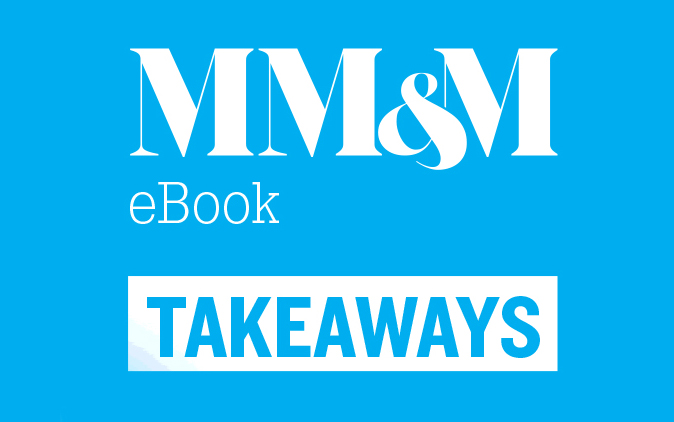 If you happened to miss the Transforming Healthcare Conference this year, don’t worry! MM&M created an ebook of takeaways for attendees and as we were a proud sponsor this year, we’ve compiled our favorite takeaways. Consider this your guide to the takeaways of the takeaways.
If you happened to miss the Transforming Healthcare Conference this year, don’t worry! MM&M created an ebook of takeaways for attendees and as we were a proud sponsor this year, we’ve compiled our favorite takeaways. Consider this your guide to the takeaways of the takeaways.
The conference theme was “accelerating innovation across the biopharma landscape.” From the opening speech by the Biden Cancer Initiative to Amazon’s closing keynote, this 4thannual MM&M conference featured “a riveting lineup of speakers who explained how biopharma marketers can up their game amidst healthcare’s unusual tenor of change,” said MM&M’s Editor-in-Chief Marc Iskowitz.
Here are our five favorite takeaways from this year.
1. Practice Does Not Make Perfect
Gregory Simon, president of the Biden Cancer Initiative and former executive director of the White House Cancer Moonshot Task Force highlighted the non sharing, non-collaborative research environment in healthcare that is “so baked in, you stop seeing it.”
Simon urged everyone to shift their perspective and start communicating. To improve the research climate he suggested we create common protocols and virtual drug arms to avoid redundant trials of the same drugs, develop patient (end-user) designed trials, and implement standards for cancer diagnosis and care.
2. Communication is Important in the Age of AI
Continuing the theme of better communication, Duncan Arbour the SVP of innovation for Syneos Health Communications, reassured us we were not alone if we’re getting lost in the vast space that is the internet of things. Patient voice has been squeezed out of healthcare, but it’s not AI’s (artificial intelligence) fault. AI can actually help connect individuals to the information and people that can help them the most.
Data from a recent WebMD survey showed that about two-thirds of physicians “would be quite happy to use AI if it’s better than humans at diagnostic tasks,” Arbour said, but the challenge remains in converting skeptical, unengaged hold-out physicians. The pharma industry needs to move into its “age of conversation” and spend more time properly explaining to physicians and patients what technology can do for them.
3. It’s Time to Put the Patient First
A mixed panel of healthcare players provided our favorite takeaway from the conference, but we might be biased as one of them was our SVP of networks and analytics, Rob Blazek. We were proud to sponsor “The Healthcare Roundup.”
Group consensus was that were are living in an era of patient-centered medicine. “It’s always been about health outcomes, but now it’s with this wraparound of the patient and provider experiences” explained Anthem VP Rachael Jones. Retailers are, and should be, focused less on the product and more on the service and what happens with the patient.
In the exploding biopharma markets, better outcomes are what matter, because “it has to be less about the product and more about the patient” Blazek said.
4. Voice Technology is Coming
Voice technology is everywhere and it’s filling interesting roles in the healthcare space. From Alexa to Siri, voice and chat technology allow people to engage in a conversational manner without pushing information. In the near future, voice is going to provide a “seamless user experience in the privacy of my living room,” said Tony Alvarez, interim digital lead and SVP of global human health for Merck.
Pharma companies can see voice as a diagnostic tool on the horizon in the next five years and are fully behind the future of voice technology. Merck has already created a tech challenge for innovators to develop Amazon Alexa-assisted service for patients with diabetes and other common health problems. Alvarez emphasized the need for partnering with other companies to look at what we can all solve together. “You have to look at solving an issue, and if you focus your efforts that way, you’re more likely to have an impact.”
5. We Need to be Willing to Fail
The closing keynote by Amazon Web Services global life sciences solutions architect Shaun Qualheim focused on insights and inspirations from Amazon’s culture of innovation. Qualheim said that focusing on providing value, selection, convenience, and driving customer satisfaction has led to the outcome that happy customers drive growth.
He shared the three most important principals that push everything Amazon does:
1. Customer obsession
2. Ownership
3. Ability to dive deep
If you put the customer first and invent on their behalf, you can be successful. But, companies have to be willing to fail in order to invent and innovate. “You have to fail. If you’re not accounting for failure, you’re not inventing and innovating,” Qualheim said. “You have to have an organization where it’s understood that taking some risk is okay if it means you’re moving forward.”
These are just a few of the many great takeaways and sound bites from this year’s conference and we can’t wait to see the changes that take place in the digital landscape in the coming year.
For more information about future MM&M events, visit mmm-online.com.
For continued reading, you might enjoy the following:
It’s Still About the Patient — Not the System
Soundbites from Transforming Healthcare 2018
A Promising Start for Digital Health



